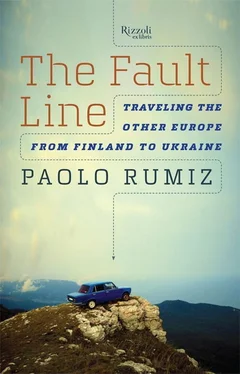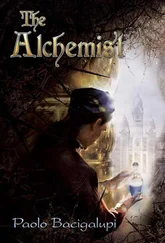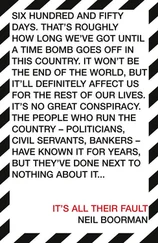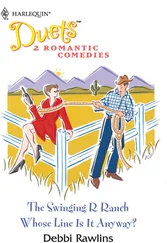“As a kid,” he writes about that place, “I had sandals made of tree bark, that’s how poor we were.” Ah, shoes, the pleasure of putting on a good pair, of traveling with them for thousands of miles. The desire to travel was born in him then, in this most loved homeland. He spoke to me about it with nostalgia in his eyes and accompanied me with his story in the fluvial labyrinth of his eastern Poland, which became Belarus after the war. He wanted to write about it, but he ran out of time. His Tartar eyes burned bright, blue under bushy gray eyebrows. “Vast forests, villages reachable only by water, dirt-poor peasants. We were the poorest of Europe’s poor. We lived on fish, mushrooms, and berries. There were Lithuanians, Jews, Poles, Belarusians, Germans, Tartars. That’s where I learned to understand the Other and the world of the least among us.”
Years ago, I flew over this piece of Europe, on a flight from Kiev to Warsaw, on a cloudless day. There were no cities or even mountains. No reference points. The land was covered by a tangled labyrinth of waterways. I was over the least perceptible watershed in Europe, a place where all it takes is a gust of wind to make a stream flow toward the Baltic instead of the Black Sea. Now I’m seeing it close-up. The water doesn’t fall, it overflows. From Polesye, the maestro used to say, you can reach the whole world by boat. Now I realize that the key to this journey is not land but water. That’s why Väinämöinen has followed me everywhere.
The West has not only run out of time, which keeps slipping through its fingers; it has also lost the reassuring company of water. It no longer burbles, roars, or lulls. The turbocracy has won across the board. But here, the song of the first element follows me and invites me. The Bug, the Vistula, the Berezina, the Dniester. I think back to the frozen black lakes of Lapland, the silver torrents among the mines of Kola, the Narva loomed over by lead-gray rival castles, and yet again to the shores of the Onega with the chaika staring into the wind, and to the Latvian lake next to the lost synagogue, where I threw my coins of remembrance. Water, without a doubt, has been my great companion. A formation of wild geese flies overhead. Meanwhile, the sky’s cloudy apparel has changed. The inky black bubbles of the Baltic have disappeared; now it is the vaporous whites that dominate. The sun comes out; swamps and lakes shine like zinc. To the southwest, a glimpse of periwinkle blue. The frontier.

11. CARPATHIANS
THE UKRAINIAN POLICE OFFICER, white shirt and lavender perfume, opens the door for us to the world where a visa is no longer necessary. Then here comes a gigantic woman selling dolls and teddy bears, overflowing with goods and flesh. “Ah, our Gypsy has arrived.” The conductor laughs, and meanwhile the train fills up with what sounds like Serbian music. I hear phrases like “my Ukraine,” “my sweetness,” and “heart of mine.” I’m plunging into the South. The language becomes more modular; the chitchat rises in volume, and the convivial Slavic warmth—momentarily gone into hibernation in Belarus—reexplodes. I recognize pieces of the journey that we’ve already done: a mother from Murmansk with two children, traveling for seventy-two hours. When she left, it was still winter, and here it’s already insufferably hot.
What a metamorphosis! The men who come aboard are less suspicious and the women more robust, suntanned like farmhands. The frequency of pale, slender Baltic beauty tapers off. The train is heading southwest, toward Lviv, in a world that’s more vigorous, sunny, Gypsyesque. Towns are not as well kept, apparently poorer, but the fields are fertile, with grazing horses and geese, as in a Soviet documentary from the 1950s. The cemeteries, joyously colorful with fresh flowers, are not enclosed; they grow up spontaneously by gemmation. The deep green of Belarus has been tinged with yellow, maybe it’s a prelude to the steppe.
Saddled horses, dust, riding boots. There’s an air of Middle Eastern caravan, and yet—how strange—I’m getting closer to home. The map says that the elbow of the Carpathians and Hungary are right next door.
My map of wonders indicates that this is the area of the Russian gas pipelines that supply Europe. The stability of the world depends on their spigots. That would be a great journey! Follow the pipe from your very own kitchen stove all the way to Siberia. An epic. I note down words like Klondike, Putinian power .
Monika fires me up, talking about the legend of the Rachmani, a subterranean people of fire carriers. The train continues southwest, but now my imagination is galloping northeast, across the Don with the Italian troops at the front in 1942, over the steppes of Oryol and Kursk, where the last open-field battle of history was fought in 1943, to the headquarters of Gazprom in Moscow, the Kremlin. Then the great mother Volga; Kazan, the city of towers on the rivers; the end of Europe and the hyperborean mountains, the Urals.
What a grandiose terrain, unexplored and current. An investigation and at the same time an exploration. Beyond the Urals, toward the oil fields trapped under the permafrost—there you have it, the world’s biggest swamp, an endless horizon of mosquitoes and migratory birds. I see the Ob, monosyllabic river, the Po of the great North, which the icebreakers just barely break open at the end of April, to the tune of dynamite blasts. Siberian stories, the tundra, the Gulags, the Arctic railways built by convicts, mammoths under the frozen ground. Novy Urengoy, the city of Utopia, reachable only by plane; the land where fire is born. Yamal, the last peninsula, the reindeer, the Arctic people threatened with extinction. The frozen Arctic Ocean, and again the madness of the midnight sun. The spaces whence we have come.
The train shoots into long valleys, imperceptible, the first change in the lay of the land since lacustrine Polesye. Until 1918, this is where Austrian Galicia began.
Outside there are signs of a different aesthetic, of a different order. A new limes , a new sign of the mobile frontiers that have determined the fate of millions of people. The ethnicities mix. At Brody a blond with a Greek profile comes aboard. She looks as though she just got off a horse, a mythic Amazon. In the back of the car, Monika has found a Gypsy of savage beauty whose eyes invite her on the road to the Carpathians.
The bus for the South is dancing wildly like a crazed tarantist, but the driver is a jelly-bellied jolly guy who sings and accelerates through the potholes because that’s the only way to get by them. The bus is jam-packed, a crowd of farmers who engage in animated conversation, eat, and sing with the windows thrown open, in an amazing vortex of spinning air. The road to Murmansk was a different music. The same potholes, but a leaden silence behind the wheel. Tinted windows hermetically sealed and a bleak gloom among the passengers. Like a paddy wagon full of detainees.
It’s amid this chaotic earthquake that the Vision appears. Beyond the clamor of the confabulating passengers, the fields of grain, the villages with their onion-domed bell towers, beyond the yellow and blue Ukrainian flags fluttering in the wind and the bus’s orange curtains, rumpled and torn by the current, there appears a black line, as wide as the entire horizon, regular as a breaker that rises up following the reflux of the surf. Mountains! The black line of the mountains!
It’s not a serrated crest like the Alps, but a barrier with a soft silhouette like a tidal wave. Barrier is the right word because the Carpathians are standing there like a dam, after thousands of miles at zero altitude, amid minimal hills, sand dunes, forests, and vast clearings.
Читать дальше













